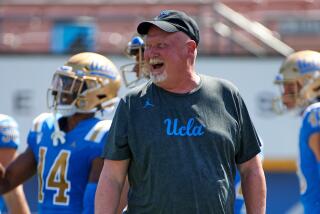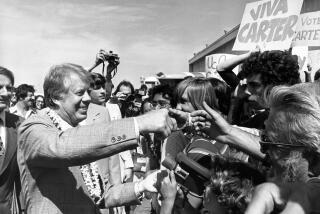Reassessing McGovern
If Americans think of Democratic candidate George McGovern at all, itâs as the man who suffered one of the worst electoral defeats of all time, losing every state but Massachusetts in his 1972 presidential contest with incumbent Republican Richard M. Nixon. It is the business of âOne Bright Shining Moment: The Forgotten Summer of George McGovernâ to change that mind-set, and it largely succeeds.
The thesis of this film, written and directed by Stephen Vittoria, is that the success of McGovernâs long-shot campaign for the Democratic nomination was a great moment in American politics, a high-water mark of idealism and citizen involvement in democracy.
The filmâs greatest asset and strongest selling point is the former senator from South Dakota himself, thoughtful and articulate at age 83, who talks candidly, even eloquently, about his political career.
McGovern, the son of a minister, flew 35 World War II missions in a B-24 before briefly attending a theological seminary and then becoming an unlikely politician. Fighting against the odds was in his nature: When he began in South Dakota politics, only two of 110 state legislators were Democrats.
Called âthe most decent man in the Senate -- probably the only oneâ by Robert F. Kennedy, McGovernâs calmness, his unmistakable sense of honesty and fair play make him a most attractive figure in todayâs world of political expediency. As supporter Warren Beatty says, âItâs hard to find someone whoâs run for something and has engendered as much affection as George McGovern.â
Hearing and seeing the senatorâs decade-long opposition to the war in Vietnam, his refusal to compromise what he believed in, makes it all too apparent what is missing in contemporary Washington. Itâs difficult to hear McGovern simply say, âLetâs bring this war to an end, letâs admit that we made a mistake, letâs stop killing these young men,â without thinking about what a message like that delivered in the manâs quiet style would mean today.
In addition to McGovernâs, the film utilizes a wide and interesting variety of articulate voices. Aside from Beatty, these include Gloria Steinem, former Yankee Jim Bouton (a McGovern delegate way back when), Ron Kovic, Dick Gregory, Gore Vidal and Howard Zinn.
âOne Bright Shining Momentâ is at its best reminding us what went right and what went wrong in the senatorâs 1972 campaign against Nixon. Among the body blows the McGovern forces never recovered from were a damaging convention credentials fight on behalf of Hubert Humphrey, the ruinous naming of Thomas Eagleton as running mate and having the nomineeâs acceptance speech nationally broadcast at 2:30 a.m. Eastern time.
Though McGovern is the furthest thing from angry, âOne Bright Shining Momentâ takes the opposite tack. It has a tendency to push too far and be too hostile, especially in writer-director Vittoriaâs hectoring voice-over read by Pacifica Radioâs Amy Goodman. Loose-cannon potshots at âmorally bankrupt power brokersâ and âpatriotic impostorsâ are likely to turn off all but the truest believers, which, given the breadth of McGovernâs on-camera appeal, is a shame.
*
âOne Bright Shining Momentâ
MPAA rating: Unrated
Times guidelines: Adult subject matter
Released by First Run Features. Director Stephen Vittoria. Producer Stephen Vittoria, Frank Fischer. Exeuctive producer Michael C. Donaldson. Screenplay Stephen Vittoria. Cinematographers Patrick Kelly, Gilbert Yousefina. Editor Jeff Sterling. Music Robert Guillory. Narrator Amy Goodman. Running time: 2 hours, 5 minutes.
In limited release.
More to Read
Get the L.A. Times Politics newsletter
Deeply reported insights into legislation, politics and policy from Sacramento, Washington and beyond. In your inbox three times per week.
You may occasionally receive promotional content from the Los Angeles Times.











